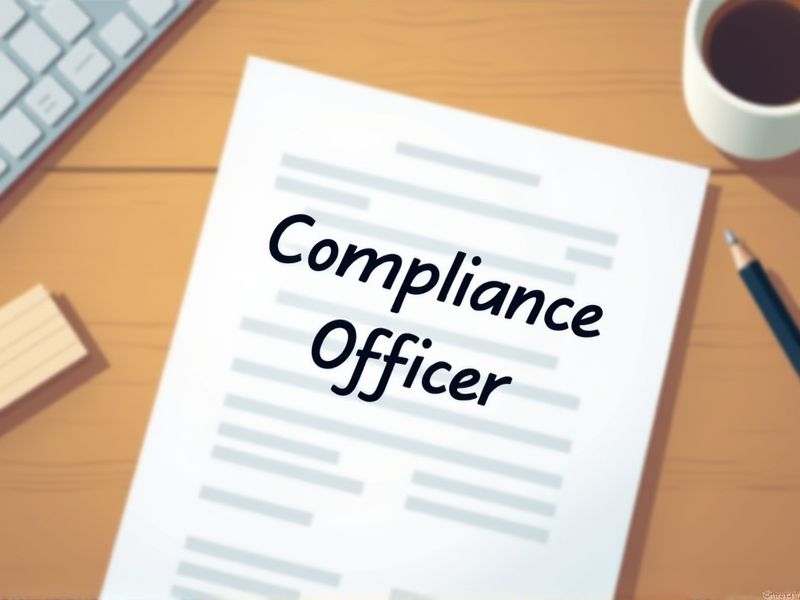
A Compliance Officer's role is critical in ensuring that companies adhere to legal standards and internal policies. Obtaining certifications demonstrates the officer's expertise and understanding of complex regulatory frameworks. Certifications also help build credibility and trust with stakeholders and clients, enhancing the officer's ability to effectively manage risk and compliance issues. Consider these essential certifications for a Compliance Officer's career advancement.
Certified Compliance & Ethics Professional (CCEP)
A Certified Compliance & Ethics Professional (CCEP) provides a structured and recognized framework for understanding complex regulatory environments, ensuring Compliance Officers are equipped to navigate legal requirements effectively. Possessing a CCEP designation enhances credibility and demonstrates a commitment to upholding ethical standards within an organization, which can build trust with stakeholders. With constantly evolving regulations, the CCEP certification ensures that Compliance Officers stay updated on best practices and emerging trends. Through comprehensive training, the CCEP equips Compliance Officers with tools to develop robust compliance programs, reducing the risk of legal infractions and financial penalties for the organization.
Certified Regulatory Compliance Manager (CRCM)
A Certified Regulatory Compliance Manager (CRCM) enhances a compliance officer's expertise by providing in-depth knowledge of regulatory requirements. Holding a CRCM credential often results in increased trust and credibility with regulators and stakeholders. The certification helps in developing strategic solutions to complex compliance issues, improving organizational risk management. This credential frequently leads to better career advancement opportunities, reflecting its growing importance in the banking and financial sectors.
Certified in Healthcare Compliance (CHC)
Certified in Healthcare Compliance (CHC) equips compliance officers with essential knowledge of healthcare regulations and relevant policies, increasing their effectiveness in maintaining regulatory adherence. This certification validates their competency, enhancing their credibility and trust within healthcare organizations. Being CHC-certified also helps mitigate risks associated with non-compliance, potentially avoiding costly fines and legal issues. As the healthcare industry constantly evolves, continuous education through CHC ensures compliance officers stay updated with the latest legal requirements and ethical standards.
Certified Anti-Money Laundering Specialist (CAMS)
The role of a Compliance Officer requires an in-depth understanding of anti-money laundering (AML) regulations and practices to ensure organizational compliance, where the CAMS certification enhances this expertise. Financial institutions face increasing regulatory scrutiny, and a CAMS-certified officer is better equipped to design and implement effective AML programs. Engaging in ongoing education and certification like CAMS helps keep compliance officers updated on evolving financial crime trends. The need for risk assessment and mitigation is critical, and CAMS equips compliance officers with the skills to identify and analyze potentially suspicious activities.
Certified Financial Services Auditor (CFSA)
A Certified Financial Services Auditor (CFSA) is needed for a compliance officer because it signifies expertise in evaluating financial service processes and ensuring adherence to regulations. Compliance officers benefit from the CFSA credential as it validates their ability to identify risks and implement effective control measures. The certification enhances one's capability to audit complex financial transactions, crucial for maintaining regulatory compliance. It fosters credibility and trust in regulatory environments, vital for the integrity and reputation of financial institutions.
Certified Information Privacy Professional (CIPP)
Certified Information Privacy Professional (CIPP) certification ensures that compliance officers have the necessary knowledge of global privacy laws and regulations. This expertise helps organizations avoid regulatory penalties and protects sensitive data effectively. CIPP equips compliance officers with tools to build and maintain robust privacy frameworks within enterprises. Having a certified professional demonstrates an organization's commitment to privacy, increasing trust with customers and stakeholders.
Certified Information Systems Auditor (CISA)
The CISA certification equips compliance officers with the skills to effectively assess and manage IT systems, ensuring alignment with regulatory standards. Understanding IT audit processes through CISA training helps compliance officers identify potential security vulnerabilities. As regulations heavily emphasize data protection, CISA knowledge allows compliance officers to implement robust information security measures. CISA-certified professionals can effectively communicate technical risks to stakeholders, facilitating informed decision-making and ensuring compliance.
Certified Fraud Examiner (CFE)
Compliance Officers face increasing regulatory pressures and complex organizational risks. Certified Fraud Examiners (CFEs) possess specialized skills in fraud detection and deterrence, enhancing compliance efforts. Their expertise in investigative techniques and understanding of law helps in identifying potential fraud risks. Integrating CFEs into compliance teams strengthens proactive measures, aligning with regulatory standards and organizational integrity goals.
Certified Risk and Compliance Management Professional (CRCMP)
Companies face increasing regulatory scrutiny, and possessing a CRCMP certification equips compliance officers with the skills to manage and mitigate risks efficiently. The certification provides a recognized standard of expertise, enhancing the officer's credibility and trust within the industry. The complexity of regulations demands specialized knowledge, which the CRCMP curriculum addresses comprehensively. Organizations benefit from a certified officer's advanced proficiency in navigating and implementing compliance frameworks, resulting in decreased likelihood of legal issues.
ISO 37301 Compliance Management Systems Lead Auditor Certification
ISO 37301 certification provides a structured framework for compliance management, which enhances a Compliance Officer's ability to develop and implement effective compliance programs. Possessing this certification demonstrates an understanding of international compliance standards, increasing credibility and trust with stakeholders. The certification equips professionals with the skills to audit compliance processes, enabling them to identify gaps and drive continuous improvement. Organizations benefit as certified officers can ensure adherence to regulations, minimizing legal risks and potential penalties.
Summary
When you earn certifications as a Compliance Officer, your job prospects often improve due to enhanced credibility in your field. Employers tend to trust your expertise more, which can lead to increased responsibilities and possibly higher compensation. With formal certifications, you're likely to find it easier to navigate complex regulatory environments and implement effective compliance programs. Over time, the organization you work for might experience fewer compliance-related issues, contributing to overall operational success.
